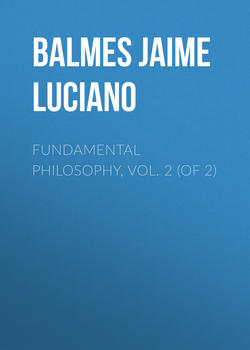Читать книгу Fundamental Philosophy, Vol. 2 (of 2) - Balmes Jaime Luciano - Страница 17
BOOK FOURTH.
ON IDEAS
CHAPTER XVII.
RELATIONS OF INTUITION WITH THE RANK OF THE PERCEPTIVE BEING
Оглавление106. The perfection of intelligence involves extension and clearness of its intuitions; the more perfect it is, the more intuitive it will be. The infinite intelligence does not know by discursion, but by intuition: it does not need to seek objects: it sees them all before itself. It sees with intuition of identity what belongs to its own essence, and with intuition of causality every thing that does or can exist outside of itself. Other minds have an intuition so much the more perfect as they are more elevated in the order to which they belong; so that cognition by conceptions indicates an imperfection of intelligence.
107. The relations of one being with other beings will therefore depend upon the rank it holds in the scale of the universe. God, infinite being, and the cause of all that does or can exist, has intimate and immediate relations with the whole universe, considered not only in its entireness but even in its smallest particles. There is consequently in God a most perfect representation of all beings taken not only in their generality, but also in their minutest differences. The Being, cause of all, does not know objects by vague conceptions, by means of representations which only show what all beings have in common, but as he has made their slightest differences, they must be presented to him with perfect clearness. His cognition is founded upon a reality which is himself; his understanding does not fluctuate through an ideal and hypothetical world; but, fixed with clearest intuition upon infinite reality, he sees all that the infinite being is, and all that it can produce with its infinite activity. For God there is no experience proceeding from without, for nothing can exert any influence upon him; all his experience consists in the knowledge and love of himself.
108. Created beings, occupying a determinate place in the scale of the universe, relate to it only under certain aspects. Their relations with their fellow beings are brought to a point of view, to which their perceptive faculties are subordinated. The representativeness, which they contain in themselves, must be proportionate to the cognition that has to produce it. Hence it follows that every intelligent being will have its representativeness adapted to the functions it has to exercise in the universe. If the being do not pertain to the order of intelligences, its perceptive faculties will be limited to sensible intuitions, in a measure corresponding to the place it is destined to occupy.
109. We have seen that general ideas and the intuition of determinate objects fecundate the intellectual faculties. From this we infer that every intelligence stands in need of intuitions, if its cognitions are not to be limited to a purely hypothetical order.
The human mind, destined to a union with the body, and to a continual communication with the corporeal universe, has received the gift of sensible intuition as the basis of its relations with bodies. The same is the case with brutes. Sensible intuition has been given to them because they must have continual relations with the external world: but, being confined to the functions of animal life, they have no intuitions superior to the sphere of sensibility, nor do they possess the force necessary to convert sensible representations into objects of intellectual combinations.
110. There is an immense difference between brutes and man, in the scale of beings. Since every intelligence is conscious of itself, and can fix its attention upon its acts, the human mind knows its own intuitively, and therefore discovers in itself an intuition superior to the sensible. Besides these intuitions, we have the power of discursion by which we form representations, and by them attain to the cognition of objects not offered immediately to our perception.
Thus, starting with the data furnished by external and internal experience, and aided by those general principles which involve the primary conditions of every intelligence and of every being, we are enabled to penetrate to the world of reality, and to know, although imperfectly, the assemblage of beings which constitute the universe, and the infinite cause which made them all.
